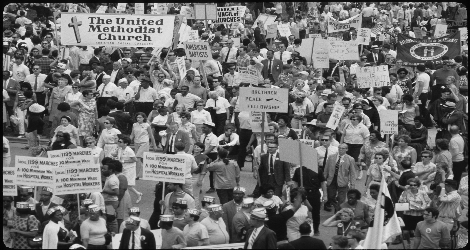“Raising up generations of religious and community leaders committed to building a social movement to end poverty led by the poor.”
HISTORY
Founded in May 2004 by Union students in collaboration with seminary faculty, staff and community leaders, the Poverty Initiative was charged with the mission of raising up generations of religious and community leaders dedicated to building a social movement to end poverty, led by the poor.
The Poverty Initiative was born of two remarkable legacies: the 175-year heritage of social justice ministries promoted by Union Theological Seminary in the City of New York and the unfinished business of the Rev. Dr. Martin Luther King, Jr. Since 1836, Union has educated leaders whose pulpits, professorships and organizations have launched and sustained the major U.S. social movements of our time including the fights for racial justice, women’s rights, LGBTQ justice, eco-justice, poverty eradication and inter-religious dialogue.
From Martin Luther King, we inherit the commitment to eliminate poverty in our nation of affluence, which was Dr. King’s mission in the last year of his life with the Poor People’s Campaign. Like Dr. King, we believe that positive social change is a moral imperative, and therefore incumbent upon religious leaders to promote.
Throughout the last seven years, the success and impact of the Poverty Initiative—both on Union’s campus and in communities throughout the country—are the direct result of the active involvement and support of the Union community including faculty, staff, trustees, students, alumni and friends.
POVERTY INITIATIVE PROGRAMS
On the Union campus…
Union is the premiere seminary for rigorous social justice-rooted training. The Poverty Initiative contributes to the theoretical and practical preparation of religious leaders who seek to understand and change the course of growing poverty and respond to community needs.
On campus, the Poverty Initiative works closely with Union faculty and seminarians to design curriculum for day- and semester-long courses, seminarian Fellows training and immersion experiences. For a complete list of past courses, visit povertyinitiative.org/theologicaleducation
In 2004, the Poverty Scholar-in-Residence Program, invited Willie Baptist—a formerly homeless father with 40 years of organizing experience and study—to serve as an advisor, Poverty Scholar and bridge between low-income and academic communities. This program laid the foundation for our expanded Poverty Scholars Program, and today Willie acts as its Coordinator.
Launched in 2010, the Poverty Initiative Fellows Program strengthens the leadership capacity, skills and community partnerships of emerging religious leaders interested in moving beyond charity toward social justice. The program involves a cohort of Masters-level students in a yearlong intensive Fellows Program that provides training, theological reflection and practical community organizing experience. Eleven Fellows participated in the program’s inaugural year.
In the community…
Beyond Union’s campus, PI works closely with faith-based institutions and community organizations by offering biblical and religious analysis, training, and faith-based strategy development. This work leverages much-needed support from local faith communities to partner organizations, while serving as a training ground for budding religious leaders.
Immersion courses take students to the epicenters of US poverty to study and meet with local religious and communities leaders. Past immersions have travelled to places like the Mississippi Delta, the post-Katrina Gulf Coast, Appalachia, and our own New York City.
Our Poverty Scholars Program identifies talented community organizers working on poverty-related issues for participation in a program of high-level, year-round training and exchange in order to increase civic participation and grassroots leadership capacity in low-income neighborhoods. Scholars work together with PI Fellows on research projects that address community needs. Scholars spend time on campus with the Union community and network with peer organizers and mentors to build lasting relationships of support and learning.
POVERTY INITIATIVE RESOURCE CENTER
Telling Untold Stories…in print and on the web
Books: Download order forms and sample chapters at www.povertyinitiative.org
Pedagogy of the Poor
(Summer 2011; Teachers College Press) By Willie Baptist, Jan Rehmann, and contributing authors. This book engages an interdisciplinary pedagogy that brings together anti-poverty grassroots activism and social theories. By combining these areas that are usually kept apart (to the detriment of each), it will be useful for both social movement activists who feel the need to combine their activism with a thorough analysis of society and educators who are looking for resources on struggles for economic and social justice to incorporate in their curriculum.
A New and Unsettling Force: Reigniting Rev. Dr. Martin Luther King Jr.’s Poor People’s Campaign
Includes chapters on the history of the Poor People’s Campaign of 1968, the role of religion and the Bible, and the importance of Art and Culture in the struggle to end poverty. Also features an interview of Bertha Burris (Queen of the Mule Train) and sixteen essays submitted by those from what we call the modern day Sanitation Workers’ struggles—organizations fighting for the same basic needs and demands for which the Poor People’s Campaign fought. The book is filled with historic and contemporary photographs.
Appalachia: Listening with Our Hearts
Traveling with the Poverty Initiative in West Virginia, Ohio, and Tennessee in January 2007, fifty participants meet with leaders of organizations of impoverished people working to overcome the economic injustice—those engaged in “the plight and the fight.” This collection of fifty-five essays and over one hundred photographs responds to those experiences.
Katrina: Listening with Our Hearts
Inspired by journals and blogs kept by students, faculty and community leaders who traveled for eight days in the Gulf Coast in January 2006, just five months after Hurricane Katrina exposed the deep and pervasive poverty in the United States, the Poverty Initiative published this 200+ page book with 90 photographs and personal and theological reflections on the issues of poverty, racism, and government responsibility raised by the disaster. Now in its second printing, this is the Poverty Initiative’s first full-length publication.








